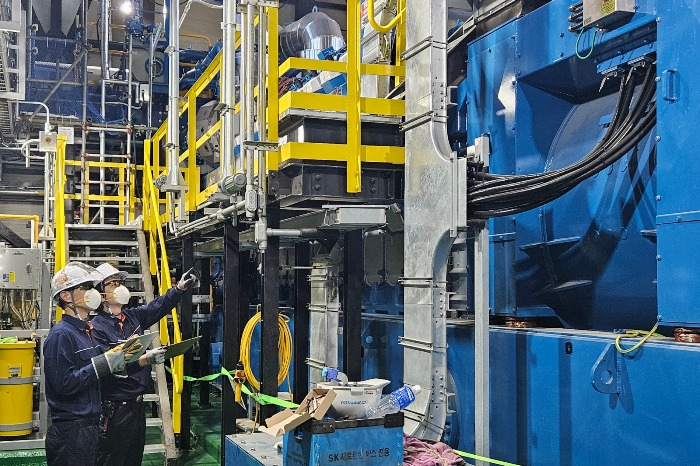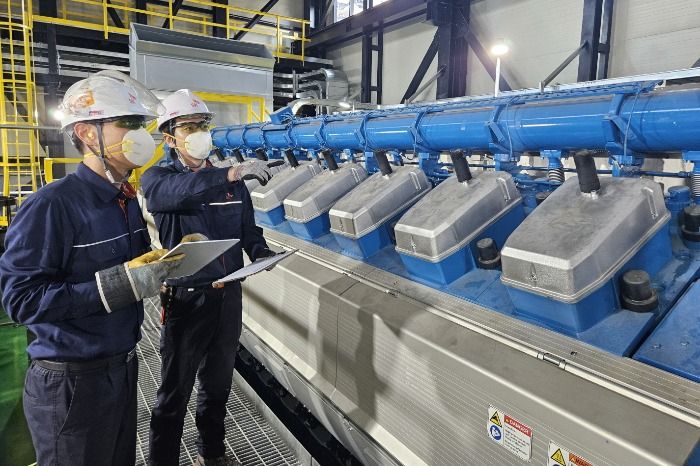Energy
SK Energy to cut emissions with combined heat power system
South Korea’s No. 1 oil refiner’s new combined heat power system will lower CO2 emissions and save power costs
By Jun 13, 2024 (Gmt+09:00)
1
Min read
Most Read
Samsung steps up AR race with advanced microdisplay for smart glasses


When in S. Korea, it’s a ritual: Foreigners make stops at CU, GS25, 7-Eleven


Maybe Happy Ending: A robot love story that rewrote Broadway playbook


NPS yet to schedule external manager selection; PE firms’ fundraising woes deepen


US auto parts tariffs take effect; Korea avoids heavy hit



SK Energy Co., a unit of South Korean oil refiner and battery maker SK Innovation Co., has begun operation of its gas combined heat power (CHP) system, which is expected to help the company reduce 48,000 tons of carbon dioxide emissions every year.
The company announced on Thursday that it has revived an old, discontinued power boiler at Ulsan Complex, or Ulsan CLX, with a gas CHP system designed with its proprietary technology in 2019.
The No. 1 Korean oil refiner expects it will reduce CO2 emissions by about 48,000 tons every year and save about 19.1 billion won ($1.4 million) in energy costs with the new power system.
Its CHP recovers heat energy from the exhaust gases of a gas-fueled engine and uses the captured heat to run a power boiler, a move expected to help reduce the consumption of liquefied natural gas (LNG) as a fuel for power boilers.

Power boilers are core facilities that produce steam to run Ulsan CLX, home to the company’s largest oil refinery and chemical plants.
SK has 10 power boilers at the complex in the country’s southeast.
It pulled the plug on the boiler, called B101, first installed in 1971, due to its outdated, inefficient system but has succeeded in reviving the boiler with the CHP system.
With the installation of the gas CHP system in an individual facility or building as district energy and microgrid resources, Ulsan CLX will be able to secure stable power and generate 75.6 gigawatt hours (GWh) worth of electricity every year.
This is part of its parent SK Group’s move to transform its main refinery and chemical complex into eco-friendly facilities with an investment of 8 trillion won ($5.8 billion).
Under the direction of SK Group Chairman Chey Tae-won, Korea’s second-largest conglomerate has for years been striving to turn Ulsan, where SK’s largest refinery and chemical complex as well as the manufacturing bases of other companies such as Hyundai Motor Co. and HD Hyundai Heavy Industires Co. are located, into Korea’s green energy hub and a smart industrial city.
Write to Sang Hoon Sung at uphoon@hankyung.com
Sookyung Seo edited this article.
More to Read
-
 Corporate strategySK Chairman Chey vows to turn Ulsan into green energy, AI hub
Corporate strategySK Chairman Chey vows to turn Ulsan into green energy, AI hubSep 15, 2023 (Gmt+09:00)
2 Min read -
 Hydrogen economySK Energy opens S.Korea's first hydrogen charging station for large trucks
Hydrogen economySK Energy opens S.Korea's first hydrogen charging station for large trucksApr 10, 2023 (Gmt+09:00)
1 Min read -
 Electric vehiclesSK, SK Energy acquire US energy solution provider Atom Power
Electric vehiclesSK, SK Energy acquire US energy solution provider Atom PowerAug 18, 2022 (Gmt+09:00)
1 Min read
Comment 0
LOG IN


